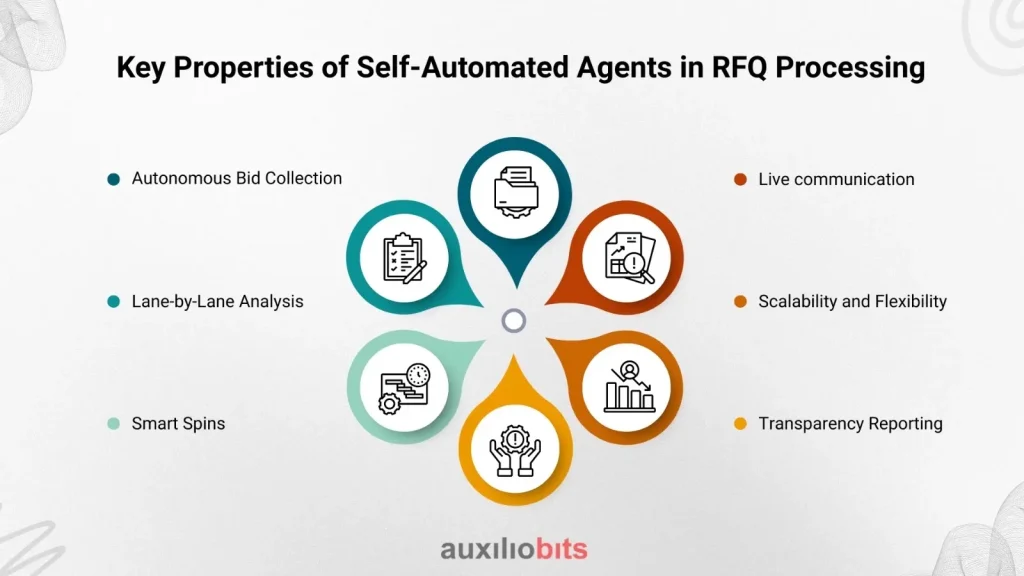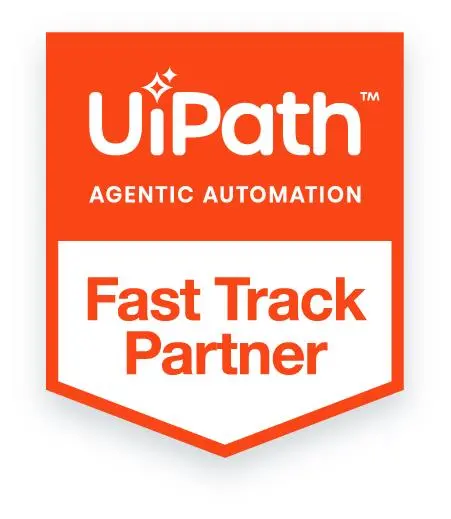
Key Takeaways
- Manual RFQ processing is time-consuming, error-prone, and unscalable, thus resulting in inefficiency and increased cost.
- Autonomous agents automate bid collection, analysis, and awarding, optimizing lane-wise decisions.
- Advantages of EDI include lower processing time, cost savings, increased accuracy, and improved supplier relationships.
- Practical applications, such as TransGlobal Logistics, demonstrate substantial ROI with AI-powered RFQ processing.
- Combining autonomous agents with current systems guarantees an integrated, scalable solution for logistics enterprises
In the hyper-connected global economy of today, supply chain and logistics operations are being asked to perform more than ever before: deliver goods faster, cheaper, and more reliably than ever before. At the center of these operations is the Request for Quotation (RFQ) process, a commercially vital process for requesting competitive bids from carriers to haul goods on pre-established lanes—routes between key stops such as warehouses, distribution centers, or manufacturing plants.
Accurate RFQ processing is not merely a logistics requirement; it’s a strategic imperative that dictates a company’s capacity to drive maximum cost savings, satisfy customer demands, and sustain a competitive advantage within an industry in which profit margins are razor-thin and disruptions, from geopolitics to natural disasters, are on the increase.
But legacy RFQ processes are mired in antiquated, manual procedures. Teams employ a patchwork of emails, spreadsheets, and phone calls to issue, analyze, and award bids—a clunky, error-prone, and incapable of keeping pace with the intricacies of modern supply chains. Legacy systems lead to slow-moving decisions, missed cost-saving opportunities, and strained supplier relationships, ultimately eroding operational agility. As international trade volumes rise and customer expectations for same-day or next-day delivery increase, companies can’t afford inefficiencies that erode their bottom line or market share.
Also read: How Autonomous Agents Improve Business Process Resilience?
Lane-by-Lane RFQ Automation with Autonomous AI Agents
Enter lane-by-lane RFQ processing by autonomous agents—a revolutionary, AI-powered solution that transforms how logistics firms manage bids and awards. Autonomous agents, powered by machine learning and natural language processing (NLP), are intelligent software agents capable of automating the RFQ process end to end—from bid collection to contract award.
By processing bids lane by lane with precision and speed, these agents eliminate manual bottlenecks, enhance decision-making quality, and maximize resource efficiency. This transformative technology enables logistics firms to respond quickly to market fluctuations, select the most cost-efficient suppliers, and meet compliance requirements—all while strengthening supplier partnerships. In doing so, they not only improve cost and time efficiency but also gain a strategic edge in a highly competitive, disruption-prone industry.
The Problem with Traditional RFQ Processing
The RFQ logistics processing entails asking for quotes in blocks of predefined transportation lanes—paths between points, e.g., between a warehouse and a distribution facility. It is a relic of time-consuming manual work that was performed through a series of emails, spreadsheets, and the telephone. The procedure of processing RFQs for defined transportation lanes entails asking several suppliers for bids.
Teams manually collect bids via portals or emails, type data into spreadsheets, and analyze bids. In the case of managing hundreds of lanes across multiple locations, this process can be done in hours or even days per lane. Repetitive tasks consume time that can be spent on more strategic activities such as route optimization or supplier relationship management.
These are some of the most prevalent issues:
- Time-Consuming Manual Work: Teams will squander hours gathering bids, matching rates, as well as brokering terms with at times multiple suppliers along lanes
- Human Error: Hand inputting data and interpreting it increases opportunities for errors, such as omitting a competing offer or being mistaken in cost calculation.
- Scalability Issues: Once lanes or suppliers scale, they cannot be sustainably supported anymore, resulting in inefficiencies.
- Slowed Contract Awards: Slow rates of response among suppliers or work units may slow contract awards, thus delaying delivery schedules.
- Suboptimal Supplier Selection: Without advanced analytics, companies may award contracts to less cost-effective or unreliable suppliers, increasing costs.
- Lack of Transparency: Manual processes lack centralized tracking, making it difficult to monitor bid statuses or supplier performance in real time.
- Suboptimal Awards: Without utilizing current data or sophisticated analytics, firms can make suboptimal awards of contracts.
Such inefficiencies in the process result in higher costs, slow timetables, and tension with suppliers. With low profit levels as well as time being a significant constraint in this business, organizations need a superior way of handling RFQs.
The Autonomous Agent Solution
Autonomous agents—AI-powered software agents with autonomous decision-making—constitute a paradigm-shifting approach towards processing RFQs lane by lane. Autonomous agents employ machine learning and natural language processing (NLP), as well as real-time data analytics, in a drive towards hastening as well as centralizing the whole RFQ lifecycle from the date of receipt of a bid until contract award. That is how they operate:
Key Properties of Self-Automated Agents in RFQ Processing

1. Autonomous Bid Collection:
Supplier portals, emails, and APIs can be combined with autonomous agents in such a way that bids can automatically be collected in real time with reduced data entry.
2.Lane-by-Lane Analysis:
All agents study lanes lane by lane with lane-level parameters of cost, transit time, and reliability, along with historical performance of suppliers.
3. Smart Spins:
There is a recommendation of an optimal supplier on one lane with a cost vs. quality of service trade-off obtained with predictive analytics along with optimization processes.
4. Live communication:
Vendors will be notified automatically of the status of the bid, call for clarifications, or negotiate terms, reducing response time.
5. Scalability and Flexibility:
It can have thousands of lanes simultaneously with thousands of suppliers, with any variable market requirement or business need.
6. Transparency Reporting:
Our agents produce in-depth reporting with dashboards, such as bidding trends, cost-saving, etc., as well as supplier performance
Advantages of Autonomous Agents
Efficiency:
It allows reducing processing time by up to 70% as team members can work on strategic tasks.
Cost Savings:
Streamlined bid analysis allows awarded contracts to go towards the lowest cost suppliers.
Accuracy:
It reduces human errors, enabling accurate calculation along with data-based decision-making.
Scalability:
It is simple to scale the system with growing lane networks or supplier pools.
Better Supplier Relationships:
Quicker, transparent communication enables collaboration and builds supplier confidence.
With connectivity with in-place systems such as Enterprise Resource Planning (ERP) systems or with Transportation Management Systems (TMS), autonomous agents facilitate seamless workflow in maximizing operational efficiencies. For more information on how logistics is optimized with automation, please go to Auxiliobits’ Supply Chain Automation Services.
Case Study: Transforming RFQ Processing
To illustrate the power of autonomous agents, let’s explore a real-world example of a mid-sized logistics company, TransGlobal Logistics, struggling with RFQ inefficiencies.
The Challenge
TransGlobal manages a network of 500 transportation lanes across North America, with over 100 suppliers submitting bids monthly. Their manual RFQ process involved:
- Collecting bids via email and spreadsheets.
- Manually comparing rates and negotiating terms.
- Spending 10–15 hours per lane to complete awards.
This process caused errors regularly, late awards, and less-than-optimal supplier choices, costing the firm $200,000 per year in inefficiencies and lost savings
The Solution
TransGlobal collaborated with Auxiliobits to realize an autonomous agent-based RFQ processing system. The solution comprised:
- Integration: The system integrated with TransGlobal’s TMS and supplier portals for automating bid collection.
- Lane-Wise Optimization: Agents evaluated bids based on a weighted scoring model that included cost, transit time, and supplier reliability.
- Automated Negotiation: Real-time requests for revised bids were automatically generated by the system when initial offers fell short of specifications, reducing negotiation time by 50%.
- Reporting Dashboard: One dashboard gave visibility into lane performance, cost trends, and supplier metrics.
The Results
In six months, TransGlobal experienced revolutionary outcomes:
- Time Savings: RFQ processing time was reduced from 15 hours to 3 hours per lane.
- Cost Savings: Streamlined awards reduced transport expenditure by 12%, amounting to $150,000 per year.
- Error Reduction: Automation removed 95% of human errors, providing precise bid analysis.
- Supplier Satisfaction: Quicker communication enhanced supplier relations, as 90% of the suppliers indicated an improved bidding experience.
This case study illustrates how autonomous agents can revolutionize RFQ processing, with tangible ROI. To discover comparable solutions, go to Auxiliobits’ AI-Powered Logistics Solutions.
Conclusion
Ready to transform your RFQ processing with autonomous agents? At Auxiliobits, we’re experts in AI-powered solutions that streamline logistics and supply chain operations. Reach out to us today to discover how our AI Automation Services can simplify your RFQ process, save costs, and increase efficiency. Let’s revolutionize your supply chain together!








